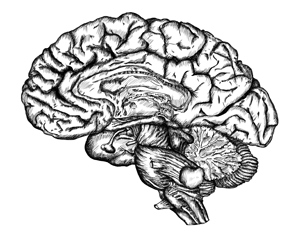Connections Between Stress and Substance Use May Be Mediated By Corticotropin-Releasing Factor
 Researchers hope to map out the neurocircuitry by which stress leads to compulsive drug taking. A recent study by Klaus Miczek and colleagues examined different rodents’ responses to the stress of being repeatedly placed in the cage of a larger, more aggressive rodent, developing what is known as defeat stress, a set of behaviors that mimic human depression. Mice and rats showed increases in the stress hormone corticosterone that did not diminish over repeated run-ins with a larger animal. Rodents who were exposed to this stress became sensitized to cocaine or amphetamine, showing hyperactivity that increased each time they accessed the drug (the opposite of a tolerance response). Some also “binged” on cocaine, which they were able to self-administrate by pushing a lever to receive infusions. The mice and rats that went through the social defeat showed elevated levels of dopamine in the nucleus accumbens, the brain’s reward center. Levels were related to the severity of their stressful experience.
Researchers hope to map out the neurocircuitry by which stress leads to compulsive drug taking. A recent study by Klaus Miczek and colleagues examined different rodents’ responses to the stress of being repeatedly placed in the cage of a larger, more aggressive rodent, developing what is known as defeat stress, a set of behaviors that mimic human depression. Mice and rats showed increases in the stress hormone corticosterone that did not diminish over repeated run-ins with a larger animal. Rodents who were exposed to this stress became sensitized to cocaine or amphetamine, showing hyperactivity that increased each time they accessed the drug (the opposite of a tolerance response). Some also “binged” on cocaine, which they were able to self-administrate by pushing a lever to receive infusions. The mice and rats that went through the social defeat showed elevated levels of dopamine in the nucleus accumbens, the brain’s reward center. Levels were related to the severity of their stressful experience.
Later the rodents had a choice between water and a 20% alcohol solution. The researchers determined what type of stress led the rodents to consume the alcohol solution instead of the water. The maximal effect was seen in two types of mice that suffered an attack of less than five minutes that resulted in a moderate number of attack bites (30); this resulted in the mice consuming large amounts (15–30 g/kg/day) of the alcohol solution. Earlier sensitization to cocaine or amphetamine did not predict later alcohol or cocaine self-administration.
When the researchers injected the rodents with antagonists of the receptors for corticotropin-releasing factor, a hormone and neurotransmitter important in stress response, prior to each episode of social defeat, the rodents did not escalate their cocaine or alcohol self-administration, indicating that CRF plays an essential role in the process by which stress makes animals prone to using substances.
In related research by Camilla Karlsson and colleagues, IL-1R1 and TNF-1R, the receptors for two inflammatory cytokines, mediated the effects of social stress on escalated alcohol use in mice.

